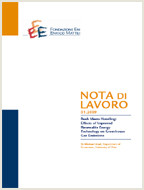Time-separable Utility, Leisure and Human Capital Accumulation: What New Implications for the Environment-Growth Nexus?

17.11.2009
Xavier Pautrel
C, Q56
Leisure, Human Capital, Environmental Tax
Climate Change and Sustainable Development
Carlo Carraro
Using a time-separable utility function where leisure is introduced through the disutility of working time and is adjusted for quality, as measured by human capital to capture home-production, we demonstrate that the environmental policy is harmful for growth. A tighter environmental tax reduces the incentives to educate by increasing leisure time and lowers the steady-state growth rate and lifetime welfare, whatever the source of pollution. We also demonstrate that labor supply elasticity plays a crucial role in the marginal impact of the environmental tax on growth and welfare. When the positive influence of human capital is added into preferences (by explicitly modelling the home production sector), we find that the environmental policy promotes steady-state growth. This result challenges the finding by Hettich (1998) according to which, in the presence of leisure, the environmental tax does not affect human capital accumulation if the source of pollution is output.
